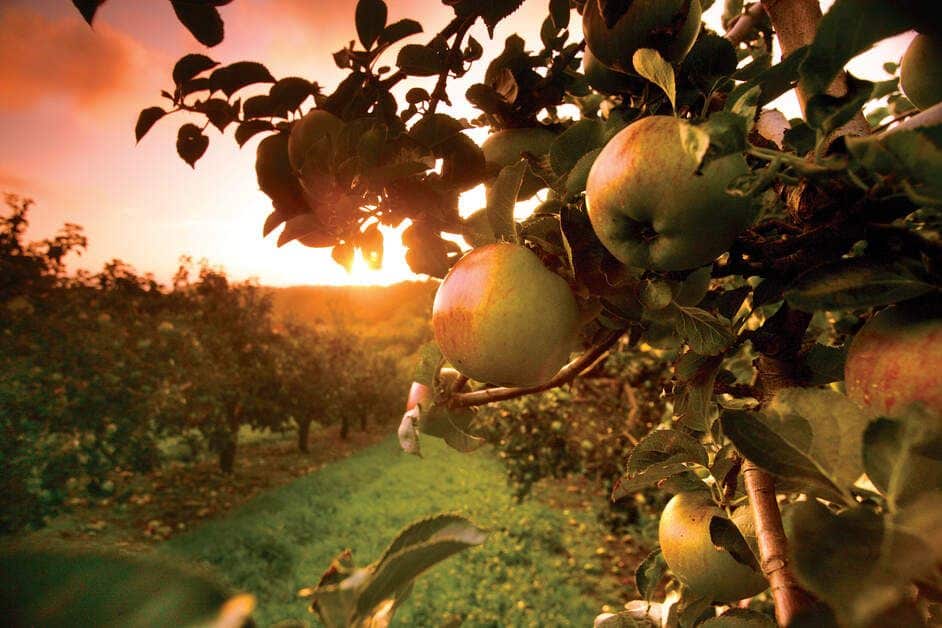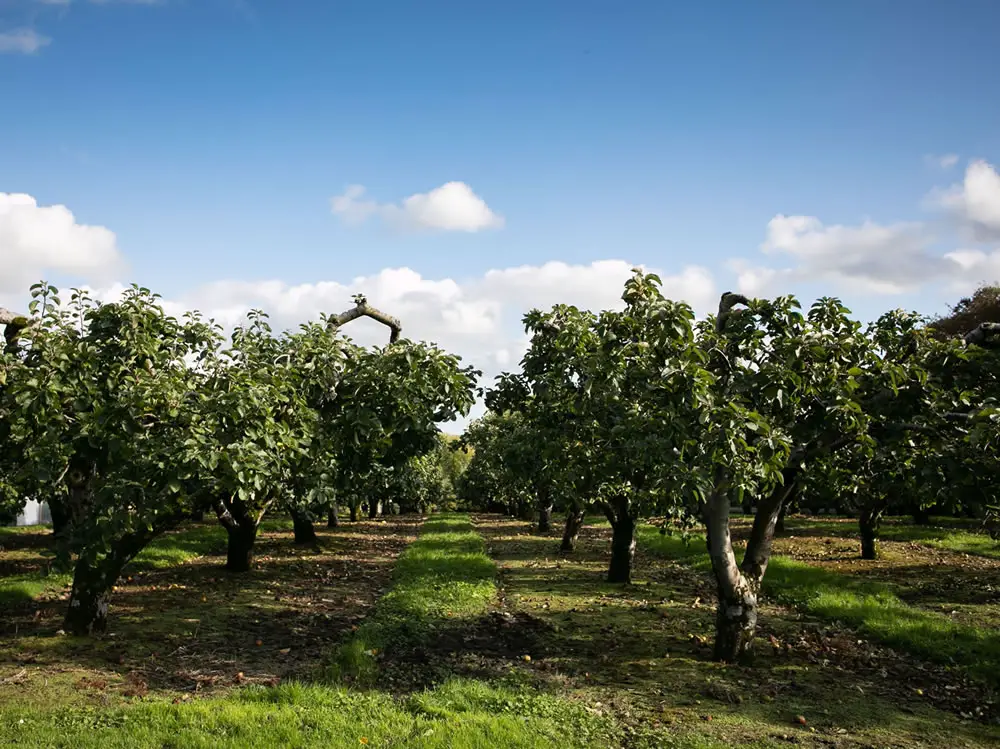
County Armagh’s famous apple-growing industry is “on its knees” and “struggling to survive”.
And many of the Orchard County’s growers could now earn half of what they would have for their crop years ago.
The claims were made by Newry and Armagh MLA Justin McNulty in an adjournment debate in the Assembly, when he demanded to know what Agriculture Minister Andrew Muir intended to do to help.
There was a cross-party chorus of calls for support from local MLAs, with Mr McNulty, who raised the matter, performing lead vocal…
He told the Assembly: “Just a few weeks ago, my son and I joined the McGleenan family on the Tullysaran Road near Blackwatertown to help collect a few tons of Armagh’s famous Bramley apples. Doing so was wonderful for the mind, the body and the soul, and I also enjoyed some of the apples that we picked, which were uniquely fresh with a distinct taste.
“We are proud to call Armagh the ‘Orchard County’. It is a name steeped in heritage, having been built on generations of hard work, skill and care. Armagh can trace its relationship with apples back as far as 1,000 BC, because there is evidence that they grew close to our historic Navan Fort. For centuries, families across our county have planted, tended to, harvested and sold the finest apples in Ireland.
“Armagh’s Bramley apples hold protected geographical indication (PGI) status, which they share with Comber potatoes, Lough Neagh eels and champagne. Despite that PGI status, 90% of the apples consumed here are imported. Just 10% are home-grown. Anyone can import apples, but not everyone can plant, grow, nurture and harvest them and then bring them to market.
“That takes experience, patience and a deep local knowledge. It is part of the culture. It is a proud tradition. The apple orchards are an integral part of who we are in Armagh.
“Today, however, our apple growers are struggling, not because of a lack of passion or skill but because they have been left behind by a system that gives them no support.

“In the Republic, apple growers can access between 20% and 40% grant aid. They also receive support for plant and equipment. That assistance is helping the Republic’s growers and processors expand, modernise and stay
competitive. In the North, however, there is no equivalent support. There is zero.
“Our growers have been forced to compete on an uneven playing field. Some of our growers are even planting new orchards in the South simply because the support is there and not here. They are upping sticks and moving to the
South. That cannot be right.”
Mr McNulty said the Minister had recently met apple growers and industry representative, “but since the positive words there has been no progress, action or tangible support.
Meanwhile, the Newry and Armagh MLA added: “The pressure on our growers is only increasing. Minister, where is the support for new orchards? Where are the incentives for new entrants to the industry? Supermarkets across Ireland are crying out for Irish-grown produce. There is a massive appetite for local apples, but our producers simply cannot meet the demand, not because they do not want to but because they cannot afford to. They are crying out for help.
“Many of our local orchards, which gave us our heritage, need to be grubbed out and replanted. The market has changed. There has been a generational shift. People are not baking apple tarts any more. The cider market, which many relied on, has dropped off dramatically, with Clonmel now taking only 30% of what was expected from the 2025 harvest. The juicers and dicers need only so much.”
Mr McNulty said a grower could get £100 for a bin of apples “years ago”, but now they were “lucky to get £50 or £60”.

“That is not sustainable,” the SDLP man declared, adding that while the potential and the ambition is there, “without support our growers simply cannot make it happen for them”.
He said: “Setting up even a basic grading and flotation system can cost three quarters of a million pounds, and that is out of reach for most small, family-owned orchards. The apple-growing industry section of DAERA is, in the industry’s own words, the ‘forgotten section’. The research capacity in the Agri-Food and Biosciences Institute (AFBI) has effectively downed tools when it comes to orchards and apple production. There is no pipeline of innovation or technical support to sustain, modernise or reinvigorate the industry.
“When we compare the support structures in the North with those in the South, the difference is stark. If a storm hits in the South, there is an immediate relief fund set up, but there is nothing provided here. Even the paperwork for getting support from Invest NI is so complicated and cumbersome that many small agribusinesses take one look at it and say, ‘Sod this. I will try to figure out a way to raise the money myself’.
“That is not how to encourage growth or innovation.”
Mr McNulty continued: “Ireland is far too small an island to have two completely different regimes when it comes to
agriculture and agri-food support. Minister, what are you doing and what is the Economy Minister doing to mirror the regulatory and support systems for farmers, growers and associated agri-businesses? A ‘little North’ status quo approach will not save an industry that is on its knees.
“The truth is that the apple industry in Armagh, which was once vibrant and financially sustainable for the parents,
grandparents, uncles and aunts of growers and producers, is now struggling to survive. It does not have to be that way. We need a clear policy shift: a strategy to move from an over-reliance on Bramleys to eating different apple varieties, which will ensure that our growers can compete fairly across this island.
“We need DAERA and the Minister to engage seriously with the industry to put in place targeted support, grants,
research, investment, and growing and production assistance to rebuild confidence and capacity in that proud sector.”

He urged both Ecomony and Agriculture Ministers to “demonstrate some vision”, adding: “Please show some
pride in our people and place. Please support an indigenous industry that is just waiting to take off. Give people, businesses and families hope.
“Can you imagine Armagh apples glimmering freshly on the shelves of every supermarket in Ireland and beyond? That is the potential. That is the BHAG — the big, hairy, audacious goal. It is achievable if this place, for once, ignited a spark of hope that could reverberate through the generations. How do you like them apples, Minister?
“It is not about just apples; it is about sustaining family farms, rural communities and a piece of our cultural identity that has shaped Armagh for generations and centuries. Let us make sure that the ‘Orchard County’ lives up to its name, not just in memory but in reality.”
Sinn Fein MLA Cathal Boylan also agreed that the local apple-growing industry had “huge potential, not just for our economy but for our environment”.
But he also said “labour shortages” were impacting the industry at present.
“One person with whom I spoke put it simply: the shortage of labour since Brexit has been a disaster for the sector. There must be a concerted effort to support the industry to recruit the workers needed to ensure that the industry thrives,” said My Boylan.

There are between 4,000 and 5,000 acres of orchards dedicated to growing apples in the Armagh area, and it is “clearly an important local element of the horticultural sector in the region”, Newry and Armagh DUP MLA William Irwin observed.
He said this year the apple crop had been “significant”, given the “very favourable growing conditions that were enjoyed throughout the summer”.
But Mr Irwin added: “That has had a major impact on the market, with an abundance of supply meaning that prices have taken a downward turn. That has undoubtedly caused concern for producers.”
The DUP representative also asked the Minister to explain what measures he could deploy “to assist growers in what is a challenging time”.
Party colleague, Upper Bann MLA Jonny Buckley, also spoke of the importance of the apple industry locally but warned “growers face significant issues”.
He said: “The big one, which we in the Chamber cannot solve, is weather conditions. The industry suffers from
weather volatility, which can affect crops and prices year-on-year. It is hard for apple growers to have a steady and sustainable income when there is such volatility. We have price volatility based on demands elsewhere. It was alluded to that, whilst we produce a large tonnage of apples locally, we are largely susceptible to global forces when it comes to the import of apples.
“The age of orchards is also an issue. When I was growing up, there were orchards everywhere in and around my home area. Some of them were old by the time that I grew up and have, therefore, been replaced. The problem is that many in the industry took the decision not to replace old orchards with new orchards, and farm diversification has led many away from the sector.”
Mr Buckley said that, in order to ensure that the industry “not only survives but thrives”, there needed to be “tangible support packages in place to benefit the growers who will stick with the industry”.
Agriculture Minister Andrew Muir said he had met apple producers and processors in County Armagh and “understand the importance of the industry to agriculture, the local society and the economy”.
He confirmed “land use for the commercial production of apples is eligible for financial support under my Department’s farm sustainability transition payment”, and would “continue to be eligible as the scheme transitions to the farm sustainability payment within the sustainable agriculture programme in 2026”.
Minister Muir said that, at the start of September, the Department of Agriculture began its 2025 farm sustainability
transition payment to farm businesses, and a total of £299,388 was paid against land in County Armagh registered for use as commercial orchards.
“That includes payments to commercial apple growers,” said the Minister.

Since 2015, funding totalling £123,758 was awarded for projects for promotional activities associated with the annual Food and Cider Weekend.
The Minister said Department was also working with the apple industry, through CAFRE, in the delivery of industry training and knowledge and technology transfer to meet its needs.
Commercial apple growers who hold a category 1 or 2 farm business ID can also avail themselves of support through the horticulture pilot scheme, said Minister Muir.
“Public awareness sessions to publicise the scheme are ongoing and have included sessions with apple growers.”
Upper Bann MLA Jonny Buckley asked the Minister if he would accept that, whether it is the farm sustainability transition payment or others, the feeling among the industry is that the “support available is far below the costs associated with both production and price volatility” and that, “if we want to ensure the growth and sustainability of the industry, there needs to be more intervention?”.
Minister Muir confirmed: “Applications for the sustainable sector growth groups and growers training support schemes will open on 31 October. In addition, under the sustainable agriculture programme, my Department is developing the sustainable farming investment scheme, which will provide financial support for equipment and technology to improve environmental performance and business efficiency.
“It is proposed that the scheme will be open to all primary production sectors, including apple growers. I have been
engaged with the Minister of Finance about funding for the new scheme. More information will be announced in the coming months.”
Turning to support schemes available in the Republic, the Minister said that “the South struggles with surpluses, whereas we struggle with deficits”.
“The financial position in Northern Ireland is challenging,” he admitted. “I continue to engage with the Finance Minister so that we can deliver support, most particularly through the sustainable farming investment scheme.
“As Minister, I will continue to engage with the sector. I understand the importance of doing so and am keen to see apple-growing expand. Armagh is indeed known as the ‘Orchard County’ and we should celebrate it.”




